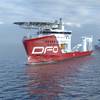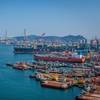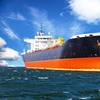A new lifeboat station has been opened on the Greek island of Chios – with the cooperation of International Maritime Rescue Federation (IMRF) members – to help support the rescue of migrants in the Aegean.
The Lifeboat station was made possible through a partnership between Koninklijke Nederlandse Redding Maatschappij (KNRM), the maritime search and rescue service from the Netherlands, and the Hellenic Rescue Team (HRT), and with the support of the Maria Tsakos Foundation along with community leaders and local volunteers.
At an event to celebrate the opening of the centre – which was completed in only three months – two lifeboat vessels donated by the KNRM, Athena and Arina to be deployed on the surrounding waters, were also christened.
The opening of the Lifeboat Station on Chios is a milestone for the project. Through the donation of rescue boats and equipment, plus three months of intensive training, the KNRM have managed to bring the station to a standard that will provide Chios with a 24/7 service on the water within 30 minutes.
Speaking at the event, IMRF CEO Bruce Reid said, “What we see here is what happens when there is a willingness within a community to stop the unnecessary loss of life and provides us with a model of cooperation, collaboration and action locally, nationally and internationally. Across borders, across diverse organizations, government and non-government, communities working together to save lives…. action not words.”
He explained that IMRF exists to help prevent loss of life in the world’s waters, so when the member organization, the Hellenic Rescue Team, came to last year’s World Maritime Rescue Congress and tabled a request for help, their call was answered by IMRF members.
“They explained the pressures on the maritime rescue services and the coastal communities in Greece trying to cope with the thousands of people risking their lives to cross the waters of the Aegean.” He said.
The HRT highlighted the risk of many lives being lost if there was no action to develop rescue services. They also pointed out that volunteers were being pushed to the limit to cope and asked if the international maritime community could help.
“Eleven months on we are here to celebrate one of the milestones of this cooperation and support. I find it personally humbling to have watched the time effort and commitment put in by all the parties involved in making this station a reality. I also feel very proud to see the work and support being provided by IMRF members the KNRM to our Greek colleagues the HRT,” Reid said.
“It is, in many ways, fitting that this project has come together on Chios, an island community with a long and proud maritime history – a community with a maritime DNA,” he added.
KNRM Director Jos Stierhout said, “This is a festive day for Chios. Not one, but two lifeboats will be added to the Chios fleet with a traditional ceremony. Two lifeboats that would not have been here if it had not been for the dramatic events here on the Aegean Sea.”
He said the KNRM had been set up by volunteers as a result of maritime tragedies and added: “Today, too, a tragedy is the cause of the formation of new rescue stations. For us, rescue at sea is not a political debate. It is not optional. Rescuing people is a duty.
“International rescue institutions from Sweden, Norway, the United Kingdom, Germany and the Netherlands have made a joint effort to come to the rescue.”
More than 200 people attended the opening ceremony including Christos Fragkias, Commander of the Hellenic Coast Guard; Captain Mr Pavlos Kalegerakis, Director of the Maria Tsakos foundation; IMRF patron Thimeo Metropolis; the Mayor of Chios, the Dutch Ambassador, the head of all of the Greek military and the President and Board of HRT.
The event was also attended by other IMRF members working in the project. The German search and rescue service (DGzRS) rescue cruiser MINDEN and her crew who are based in Lesvos, the two Swedish Sea Rescue Society (SSRS) Yellow Boats and Crew based in Samos and volunteers from Spain’s Humanitarian Maritime Rescue (SMH).












